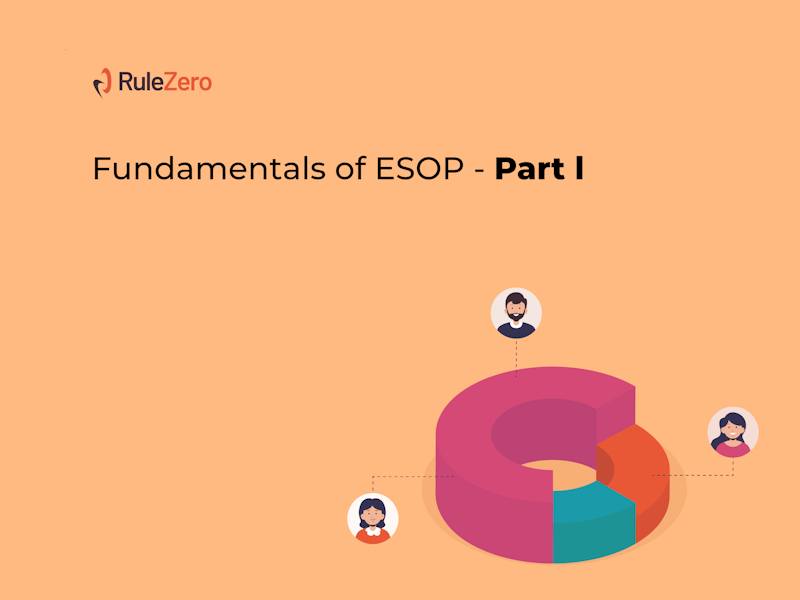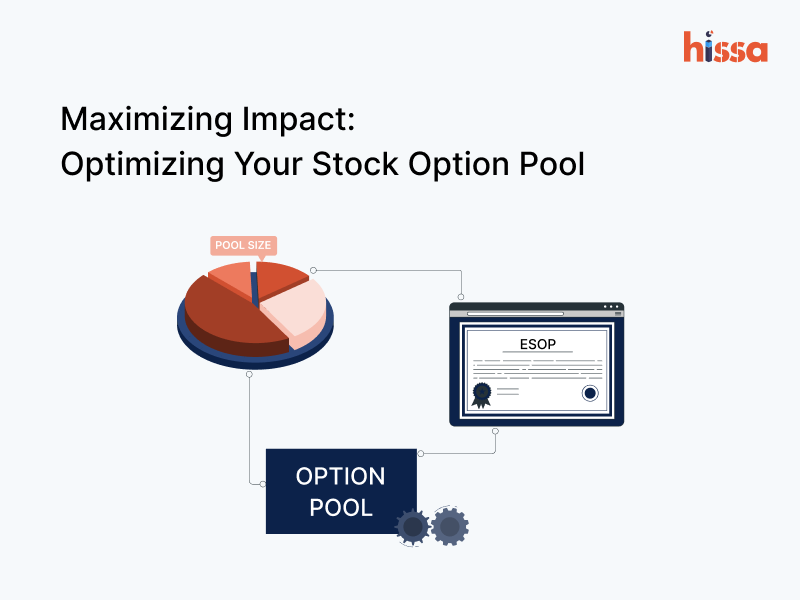What are Employee Stock Option Plans (ESOPs)? Why are they making so much noise in the startup ecosystem? Why does it continue to be a valuable tool for startups to attract and retain top talent?
Let’s dive into some frequently asked questions about ESOPs and learn more about how they work:
1. What are options and why are they issued?
What?
Simply put, options are ‘rights’ granted to employees (and not obligations) to acquire the shares of the employer company at a fixed price (or strike price) against the satisfaction of some conditions (vesting conditions). While the employee is not bound to exercise the options, the company is bound to honour the grants as per its terms and conditions.
Why?
Tangible benefits: Employee ownership means that they participate in the growth of the company. This will therefore help attract and retain talent and incentivise employees to work for the growth of the company.
Intangible benefits: Firstly ownership in the company helps create an emotional connection with the company. Secondly, it is a way for the management to express the grantees’ (employees) importance in the company. Thirdly, if done well, company goals can be aligned with individual goals. This gesture goes a long way in, motivating the personnel, building teams, reducing attrition and improving the “employee brand” of the company.
2. What is a share?
A share is a part of the capital of the company. Shareholders are the “owners’ of the company. The ownership of the company is divided into shares.
Loosely put, if the company has 100 shares and I own 1 share, I can claim to own 1% of the company.
3. Are there different kinds of shares?
Yes. Broadly, there are equity shares and preference shares.
Preference Shares are issued to investors for capital invested. Common shares also knows as ordinary shares or equity shares are issued to founders and management.
The key difference between the two is that preference shares have some special rights built in like ‘liquidation preference’ and ‘anti-dilution protection’.
4. How are options and shares different?
An option is a right to acquire a share. Only when the option is exercised, the option holder acquires the shares by paying the strike price.
5. Does an option holder have the rights of a shareholder?
An option holder is not considered a shareholder of the company and does not have the rights available to the shareholders of the company.
6.Who can a company issue options ?
Indian law only permits companies to issue options to employees and directors of the company and its subsidiaries (and holding companies). However, SARS or Phantom Units can be issued to advisors and consultants.
7. What are the different kinds of options?
1. Employee Stock Option Plan(ESOP): ESOPs are intended to encourage employees to acquire ownership in the company. Under this plan, employees have the option to purchase the company’s shares in the future at a fixed discounted price. This means, employees can convert their options to shares at a price lower than the existing value of shares, the difference being the reward for the employees.
2. Employee Stock Purchase Plan (ESPP): Employees have the right to purchase the shares of the company at a discounted value. In few companies, an agreed percentage of the employee’s salary is deducted which is then aggregated to buy the company’s stock on scheduled dates in the future.
3. Stock Appreciation rights/Phantom Plans: The options do not convert to shares at a predetermined price. Instead, the employees receive the return either in the form of cash or shares equivalent to how much the stock has appreciated in value between two set dates i.e. the grant data and exercise date. The appreciated value is the difference between the market value of stock and the grant price between these dates.
4. Trust: The company sets up a trust to whom legal ownership of shares is granted. The trust then grants beneficial ownership of the shares to the employees of the company. The trust here acts as an intermediary between the employees and the company to carry out the transactions regarding options. On exercising stock options, employees are granted all economic benefits of ownership of shares like the right to receive dividend, vote etc., while legal ownership remains with the trust.
8. What are the different stages of stock options in the life-cycle of a plan?
Creation of a Pool. An option pool is the pool that is earmarked for making grants.
Adoption of a Plan. Grants may be made only under a plan. The plans are usually called ‘ESOP Plans’ or ‘Employee Stock Option Plans’. SARS are granted under SARS Plans or Phantom Plans.
Making Grants. This is the act of telling an employee that he/she has received an option. This is done by issuing a grant letter. The grant letter typically sets out the details of the number of options granted, the vesting conditions, strike price etc.
Vesting of Grants. Vesting is the process by which a grantee’s right to acquire the underlying shares fructifies. Vesting is subject to satisfaction of some conditions called the vesting conditions.
The most common conditions for vesting are linked to time. The plans generally provide for a four-year vesting (with the grant vesting equally each year) with a one-year cliff. A cliff restricts the employees from leaving the company with shares after having worked for only a few months. Options granted without cliff puts the company at a disadvantage because the replacement hired may also need to be compensated with stock options. After the first year, the practice is varied. Vesting may be monthly, quarterly or annual, with quarterly vesting being the most common practice.
In some cases, vesting may be linked to performance. This can be the employees reaching a sales target, effective client engagement etc.
The third condition can be event based. Here, options could be linked to the company achieving some revenue targets, profitability, etc.
Exercise. Exercise is the act of subscribing to or purchasing the shares. This involves sending a letter of exercise. Once options are exercised, the company issues shares to the grantee and the grantee becomes a shareholder. If the plan is being administered by a trust, the trust transfers shares to the grantee.
Exercise of shares is considered as a taxable event in India. The gains made on exercise are taxed as employment income for the grantee. An important point to note is while the individual has a right to exercise the grants or stock options; there is no obligation or compulsion to exercise the right.
Buyback of Options. Companies may run option buyback / surrender programmes for options. These programmes provide liquidity to employees.
Disposal of Shares. If options have been exercised, the final phase would be the sale of shares. The share sale may happen in four broad situations: (a) company facilitated acquisition of shares by third parties, (b) company buyback, (c) as part of the acquisition of the company, and (d) sale by the grantee post the IPO.
Sometimes, grantees are able to sell to private buyers prior to a listing of the company’s shares.
9. What is a stock option pool? How is the percentage of the pool decided?
The option pool refers to the pool from which options are granted. Typically, this is expressed as a percentage of the capitalisation of the company. For instance, if the company has issued a total of 90,000 shares and the option pool is 10,000 shares, the option pool is said to be 10% of the capital.
Option pools typically vary from 5% to 15% of the capital of a company with 10% being the most common. The pool size is determined based on the company’s hiring plan in the next one to two years.
Traditionally, option pools were created as part of the first institutional round of equity financing. However, of late, companies have started creating pools earlier on.
The option pool is divided into (a) Options to be granted, (b) Options granted but not vested, and (c) Options vested but not exercised.
10. Is a company bound to exhaust its pool?
No. A company is not bound to exhaust the entire option pool. In fact the company is not obligated to even make a single grant. The stock option plans and pools only enable the company to make grants.
11. Can a plan be amended?
A plan can always be amended by the company. However, the law provides that a plan cannot be amended in a manner that is prejudicial to the grantees.
12. Can a grant be amended?
The company can always amend a grant in a manner that is favourable to the grantee. If the amendment is not favourable to the grantee, the grantee’s consent will be needed.







